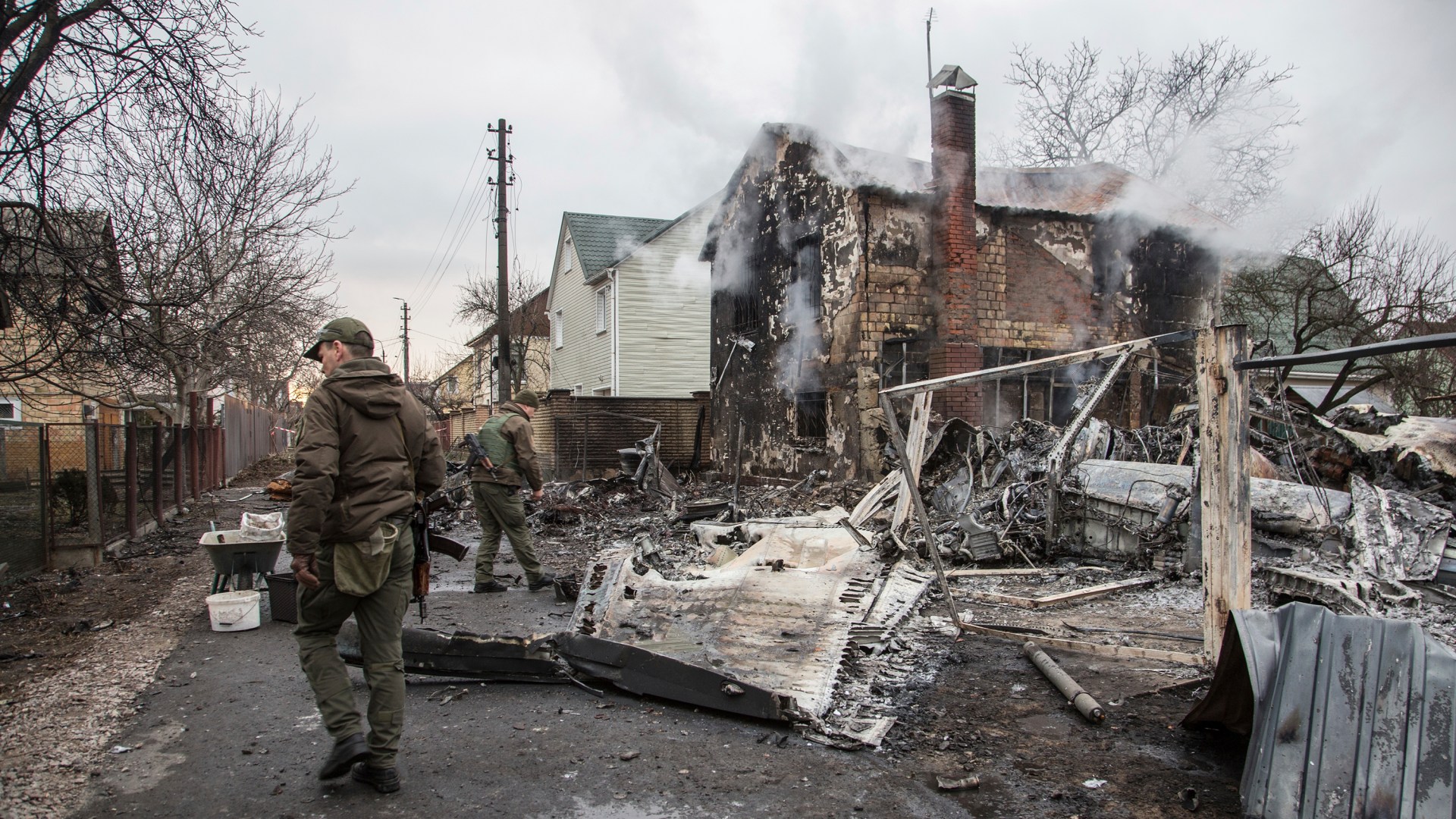War is terrible. My wife and her family were in her home country of Congo-Brazzaville (Republic of the Congo) for 18 months, and the sociopolitical forces that took tens of thousands of lives there can only be described as evil. The Great Lakes War that claimed millions of lives in neighboring Congo-Kinshasa (Democratic Republic of the Congo) enlarges the evil to another scale. The darkness of Adolf Hitler’s Third Reich dwarfs comprehension.
Now in 2022, the war in Ukraine brings violent evil to the fore once again and threatens to reshape our global future in ways we can only imagine.
Human selfishness and greed are among the sins that spawn wars: “Where do the wars and where do the conflicts among you come from? Is it not from your passions that make war within your members?” (James 4:1, NAB). Collectively, however, the scale of human suffering at the hands of others also seems to presume a dimension of cosmic evil that defies even our recognition of human depravity.
There are reasons for that. The Book of Daniel speaks not just of a succession of world empires but of the spiritual forces behind them. The angelic prince of Persia delayed an answer to Daniel’s prayers until Michael, Israel’s prince, intervened; the angelic prince of Alexander’s empire would follow (Dan. 10:13, 20–21; 12:1). God had sovereignly allotted times in history for various angels and their empires, but his angelic and human servants must continue to work for his purposes until he causes them to prevail.
The Greek translation of Deuteronomy mentions that God appointed angels over the various nations, and Jewish thought increasingly recognized such heavenly rulers and authorities—what later rabbis called angels over the nations. These beings were typically hostile toward God’s people, but in the end, God would give the kingdom to his persevering people.
Because our king, Jesus, has already come, Satan has been defeated. Jesus’ exaltation corresponds with the angel Michael’s heavenly triumph over the dragon (Rev. 12:7–8).
In explaining this story, scholars often invoke the World War II analogy between D-Day and V-Day. In D-Day, the success of the Normandy invasion decided the outcome of the war, and the defeat of the Nazi regime and its allies was merely a matter of time. Yet until V-Day—the final surrender of the Axis powers—battles continued and casualties mounted.
In the same way, all enemies—including the final one, death itself—will be subdued when Jesus returns (Ps. 110:1; 1 Cor. 15:25–26), but his servants face continuing battles until then.
In Ephesians, Paul emphasizes that Jesus is already enthroned above heavenly rulers and authorities (Eph. 1:20–22) and we are spiritually enthroned with him (1:22-23; 2:6). In a letter that heavily underscores the unity between Jews and Gentiles in Christ’s body, this enthronement above angels of nations and empires means that our unity in Christ is greater than all the ethnic and national divisions fomented by such angels. Believers are no longer subject to the prince of this world (Eph. 2:1–3).
 Kipp74 / Getty
Kipp74 / GettyFor Paul, this triumph over divisions has spiritual warfare ramifications, even for the interpersonal dimensions of our lives. In Ephesians 4, for example, denying the devil an opportunity means having integrity and controlling our anger (v. 25–27). In Ephesians 6:10–20, it means taking hold of the defensive armor of truth, faith, and righteousness, plus a weapon for invading hostile territory: the mission of the gospel.
I have sometimes seen brothers and sisters trying to engage in spiritual warfare by rebuking and commanding the heavenly rulers. However, this activity misunderstands our role. We are enthroned with Christ, and yes, someday we will judge angels, but we can’t confuse D-Day with V-Day. Scripture expressly warns against reviling angelic authorities (2 Pet. 2:10), pointing out that even their fellow angels can confront them only by divine authorization (2 Pet. 2:11; Jude 9).
Trying to cast down heavenly powers is different from casting demons out of those they afflict on earth. We are the ground forces, not the air force. This doesn’t mean we don’t have a vital role in cosmic-level spiritual warfare. It just means our modern taste for instant results won’t be met.
In the Book of Daniel, God’s answer was immediate (Dan. 10:12). But Daniel persevered in prayer for three weeks before he received his answer (10:2–3). God showed him that empires would rise and fall but the future did not belong to them.
The Book of Revelation offers the same picture: Satan stands behind the beast of a world empire, Babylon the Great. But the future belongs not to Babylon, the prostitute, but to New Jerusalem, the bride.
The Bible reminds us that not all spiritual forces are the bad guys. God is at work even in the present world, and Scripture leads us to expect that prayers can make a difference in times of war and conflict.
Before Jacob would have to confront his brother Esau’s armed band, he wrestled all night with an angel. Although later rabbis thought it was Edom’s guardian angel, it was the Lord himself (Hos. 12:3–5). But the rabbis were right, at least, that winning the spiritual battle first made the difference for the imminent earthly conflict.
The same lesson appears when Moses’ uplifted hands determined the battle against the Amalekites (Ex. 17:11–13). Our earthly actions have heavenly consequences. (See Ephesians 6:12 in the context of 6:10-20, and the likely meaning of Luke 10:17-18.)
Indeed, on the cosmic level, God’s forces easily outnumber the hostile ones. Elisha’s apprentice learned that lesson when God opened his eyes to see the mountain full of chariots of fire (2 Kings 6:16–17). On that occasion, the Lord miraculously blinded an entire army to allow a peaceful resolution instead of a costly human battle (6:18–23).
In another war story, God gave David victory in battle once he heard the Lord’s heavenly hosts marching for him (2 Sam. 5:24; 1 Chron. 14:15). Joshua likewise achieved victory after meeting the captain of the Lord’s army (Josh. 5:13–15).
In other words, God hears us when we pray. In the Book of Daniel, arrogant nations appear as nothing more than pawns in God’s larger plan for history. By contrast, the angel announces that Daniel, the man of prayer, is precious to God (Dan. 10:11).
Here’s why this common theme matters: The final outcome is already decided, but in the meantime, earthly battles continue, and individual lives remain in the balance. The prayers of a righteous person count more before God than the plans of arrogant powers in heaven or on earth.
I confess that, were it not for my faith in Scripture, these claims would sound pretty hollow to me in times of mass suffering. But because I do believe the Bible, I take courage for the future. Likewise, it was my wife’s faith in Christ and God’s Word that nourished her hope and enabled her survival in the face of war in the Congo.
In the current war in Ukraine and other conflicts around the world, we do not yet see all of Jesus’ enemies visibly under his feet, and casualties remain high. But Jesus’ exaltation over angels and authorities and powers (1 Pet. 3:22) has already decided the final outcome of the cosmic war of the ages. We can rest in that truth.
Craig Keener is professor of biblical studies at Asbury Theological Seminary. He is the author of Christobiography: Memories, History, and the Reliability of the Gospels.












